可数名词语法要点
- 格式:doc
- 大小:129.50 KB
- 文档页数:10

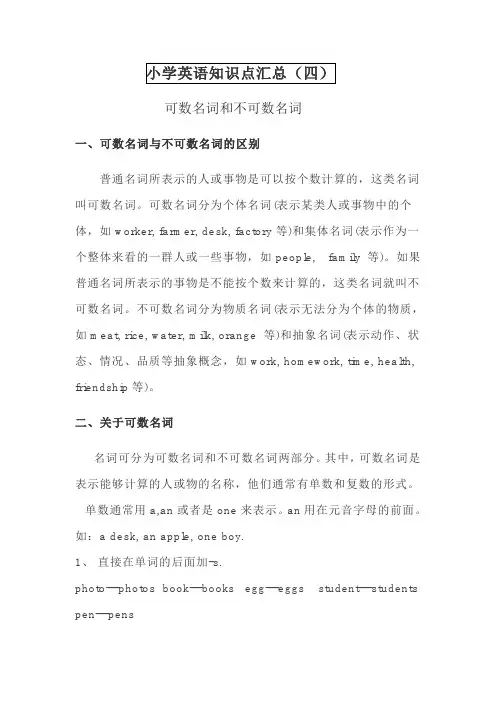
可数名词和不可数名词一、可数名词与不可数名词的区别普通名词所表示的人或事物是可以按个数计算的,这类名词叫可数名词。
可数名词分为个体名词(表示某类人或事物中的个体,如worker, farmer, desk, factory等)和集体名词(表示作为一个整体来看的一群人或一些事物,如people,family 等)。
如果普通名词所表示的事物是不能按个数来计算的,这类名词就叫不可数名词。
不可数名词分为物质名词(表示无法分为个体的物质,如meat, rice, water, milk, orange 等)和抽象名词(表示动作、状态、情况、品质等抽象概念,如work, homework, time, health, friendship等)。
二、关于可数名词名词可分为可数名词和不可数名词两部分。
其中,可数名词是表示能够计算的人或物的名称,他们通常有单数和复数的形式。
单数通常用a,an或者是one来表示。
an用在元音字母的前面。
如:a desk, an apple, one boy.1、直接在单词的后面加-s.photo---photos book---books egg---eggs student---students pen---pensvillage---villages building---buildings cloud---clouds flower---flowershand---hands map---maps girl---girls2、如果单词以s,x,ch,sh结尾,通常要在单词后面加-es.bus---buses class---classes box---box dress---dresses pe ach---peacheswatch---watches fish---fishes3、以辅音字母+y结尾的单数名词要把y变为i,再加-es.如果y 的前面是元音字母,则直接加上-s.family---families story---stories baby---babies day---days t oy---toys boy---boys4、以f,fe结尾的单词,要把f,fe变为v,再加-es.knife---knives wolf---wolves shelf---shelves5、以o结尾的单词一般加-s构成复数,但是potato, tomato,hero 等词要加-es构成复数。
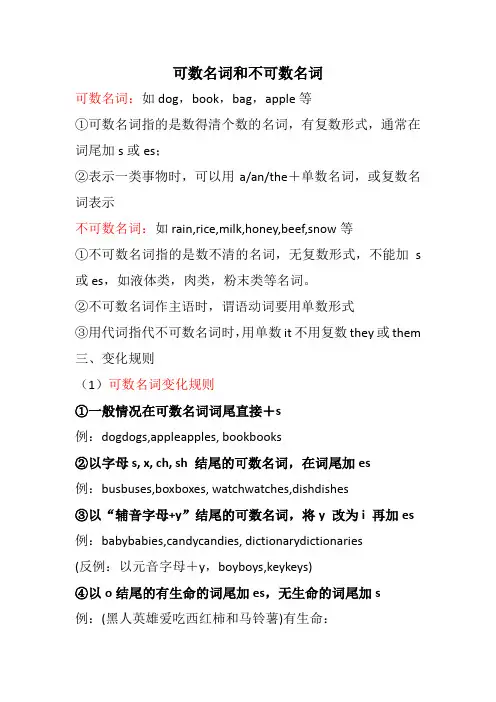
可数名词和不可数名词可数名词:如dog,book,bag,apple等①可数名词指的是数得清个数的名词,有复数形式,通常在词尾加s或es;②表示一类事物时,可以用a/an/the+单数名词,或复数名词表示不可数名词:如rain,rice,milk,honey,beef,snow等①不可数名词指的是数不清的名词,无复数形式,不能加s 或es,如液体类,肉类,粉末类等名词。
②不可数名词作主语时,谓语动词要用单数形式③用代词指代不可数名词时,用单数it不用复数they或them 三、变化规则(1)可数名词变化规则①一般情况在可数名词词尾直接+s例:dogdogs,appleapples, bookbooks②以字母s, x, ch, sh 结尾的可数名词,在词尾加es例:busbuses,boxboxes, watchwatches,dishdishes③以“辅音字母+y”结尾的可数名词,将y 改为i 再加es 例:babybabies,candycandies, dictionarydictionaries(反例:以元音字母+y,boyboys,keykeys)④以o结尾的有生命的词尾加es,无生命的词尾加s例:(黑人英雄爱吃西红柿和马铃薯)有生命:negronegroes,heroheroes,tomatotomatoes, potatopotatoes无生命radioradios, photophotos⑤以字母f或fe结尾的名词,要将f或fe改为v,再在词尾加es 例:(半片树叶看见妻子拿刀去宰狼)halflalves, leafleaves, wifewives, knifeknives, wolfwolves⑥特例sheepsheep,fishfish (不变)footfeet,toothteeth (double o变double e) manmen,womanwomen (a变e)childchildren,mousemice(2)不可数名词不可数名词的数量要借助“基数词+表示量的名词+of”短语表达例:two boxes of milk,three pieces of bread,two cups of water 题目一、写出下列名词(词组)的复数形式banana_________ apple__________ tomato ___________desk___________ radio___________ library __________box__________ class____________ knife __________watch__________ dictionary ____________model plane____________ tape player ______________pencil box______________ woman teacher_____________二、单项选择1.There is some_______on the table.A.cakesB.meat2.I'm hungry , I want to eat some________.A.bread3.I don't like_______.A. appleB.bananas C . waters4.—Do you like_______?—Yes.I like them very much.5.—Mom,can I have some_______?’s in the cup on the table.A.6.I want to have three _______ and two ______.A.orange;pearsB.oranges;pearC.oranges;pearsD.orange;pear7.—What do you often have for breakfast?—I often have an egg,some________and a glass of milk.A.apple8.—Does Jenny like _______?—Yes,she _______.A.egg;doesB.tomatoes;doC.tomatoes;doesD.eggs;do三、用括号内所给单词的适当形式填空1.—What fruit do you like?—__________ (strawberry).2.Where are the _______ (photo) ?3.Tom's brother has an egg and a glass of ________(milk) for breakfast.4.Would you like some________(rice)?5.I would like to have some______(tomato)and two_____(pear) for dinner.6.I love sports and I often play _______(they).7.I have three good_______ (friend).8.Look! There are two________(dictionary) on the desk.9.Mary has four_______(class)on Monday morning.’s and Jenny’s_________(birthday) are in May.【答案】一、bananas apples tomatoes desk radio libraries boxes classes knives watches dictionariesmodel planes tape playerspencil boxes women teachers二、BABCB CBC三、1.strawberries 2.photos k 4.rice 5.tomatoes pears6.them7.friends8.dictionaries9.classes 10.birthdays。
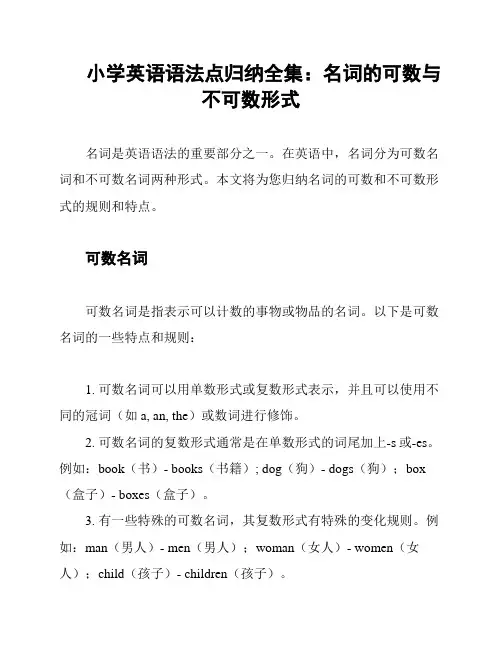
小学英语语法点归纳全集:名词的可数与不可数形式名词是英语语法的重要部分之一。
在英语中,名词分为可数名词和不可数名词两种形式。
本文将为您归纳名词的可数和不可数形式的规则和特点。
可数名词可数名词是指表示可以计数的事物或物品的名词。
以下是可数名词的一些特点和规则:1. 可数名词可以用单数形式或复数形式表示,并且可以使用不同的冠词(如a, an, the)或数词进行修饰。
2. 可数名词的复数形式通常是在单数形式的词尾加上-s或-es。
例如:book(书)- books(书籍); dog(狗)- dogs(狗);box (盒子)- boxes(盒子)。
3. 有一些特殊的可数名词,其复数形式有特殊的变化规则。
例如:man(男人)- men(男人);woman(女人)- women(女人);child(孩子)- children(孩子)。
4. 可数名词通常可以用来表示具体的事物、人或物品。
例如:apple(苹果)、student(学生)、car(汽车)。
不可数名词不可数名词是指表示无法计数的事物、物质或抽象概念的名词。
以下是不可数名词的一些特点和规则:1. 不可数名词通常只有单数形式,不能用复数形式表示。
因此,在句子中,不可数名词通常不需要使用冠词或数词进行修饰。
2. 虽然不可数名词没有复数形式,但可以使用一些量词或表达方法来表示不同的数量或程度。
例如:water(水)可以用a bottleof water(一瓶水)来表示。
3. 不可数名词通常可以表示物质、食物、感情、抽象概念等。
例如:milk(牛奶)、rice(米饭)、love(爱)。
以上就是有关名词的可数和不可数形式的归纳总结。
掌握这些规则和特点,可以帮助学生更好地理解和运用英语语法中的名词部分。
参考资料:- English Grammar – Countable and Uncountable Nouns(英语语法-可数名词和不可数名词)。
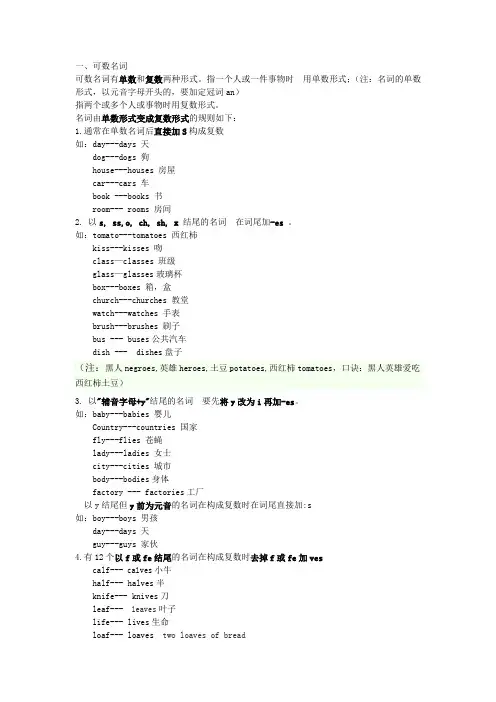
一、可数名词可数名词有单数和复数两种形式。
指一个人或一件事物时用单数形式;(注:名词的单数形式,以元音字母开头的,要加定冠词an)指两个或多个人或事物时用复数形式。
名词由单数形式变成复数形式的规则如下:1.通常在单数名词后直接加S构成复数如:day---days 天dog---dogs 狗house---houses 房屋car---cars 车book ---books 书room--- rooms 房间2. 以s, ss,o, ch, sh, x 结尾的名词在词尾加-es。
如:tomato---tomatoes 西红柿kiss---kisses 吻class—classes 班级glass—glasses玻璃杯box---boxes 箱,盒church---churches 教堂watch---watches 手表brush---brushes 刷子bus --- buses公共汽车dish --- dishes盘子(注:黑人negroes,英雄heroes,土豆potatoes,西红柿tomatoes,口诀:黑人英雄爱吃西红柿土豆)3. 以"辅音字母+y"结尾的名词要先将y改为i再加-es。
如:baby---babies 婴儿Country---countries 国家fly---flies 苍蝇lady---ladies 女士city---cities 城市body---bodies身体factory --- factories工厂以y结尾但y前为元音的名词在构成复数时在词尾直接加:s如:boy---boys 男孩day---days 天guy---guys 家伙4.有12个以f或fe结尾的名词在构成复数时去掉f或fe加vescalf---calves小牛half--- halves半knife--- knives刀leaf---leaves叶子life--- lives生命loaf--- loaves two loaves of breadself--- selves自身sheaf--- sheaves捆shelf--- shelves架子thief---thieves贼wife--- wives妻子wolf--- wolves狼二、名词复数的不规则变化foot---feet 英尺,脚tooth---teeth 牙齿goose---geese 鹅louse---lice 虱子mouse---mice 老鼠man---men 男人policeman ---policemen警察woman---women 女人child--- children孩子sheep(羊,羊群), Chinese(中国人), Japanese(日本人)单、复数同形people单数形式表示复数意义,要求谓语动词用复数;people的复数形式peoples通常指“多个民族”三、不可数名词:如果一个名词所代表的事物“切”成两半之后仍为该物比如说“water”一词分成两半之后仍称做“water”,那么它就是不可数名词。
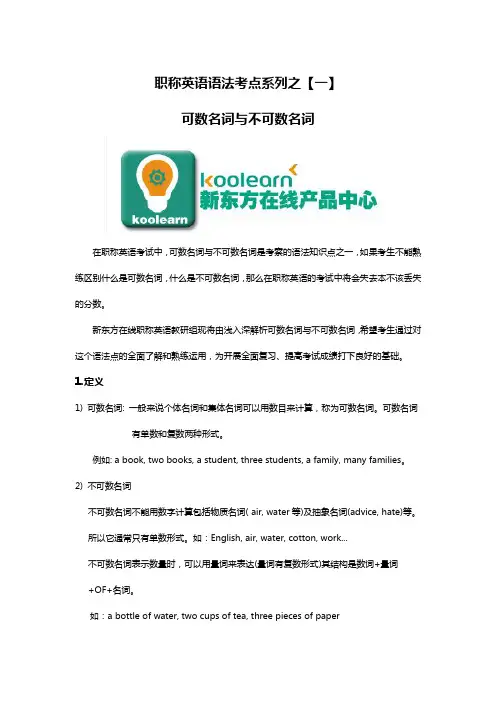
职称英语语法考点系列之【一】可数名词与不可数名词在职称英语考试中,可数名词与不可数名词是考察的语法知识点之一,如果考生不能熟练区别什么是可数名词,什么是不可数名词,那么在职称英语的考试中将会失去本不该丢失的分数。
新东方在线职称英语教研组现将由浅入深解析可数名词与不可数名词,希望考生通过对这个语法点的全面了解和熟练运用,为开展全面复习、提高考试成绩打下良好的基础。
1.定义1) 可数名词: 一般来说个体名词和集体名词可以用数目来计算,称为可数名词。
可数名词有单数和复数两种形式。
例如: a book, two books, a student, three students, a family, many families。
2) 不可数名词不可数名词不能用数字计算包括物质名词( air, water等)及抽象名词(advice, hate)等。
所以它通常只有单数形式。
如:English, air, water, cotton, work...不可数名词表示数量时,可以用量词来表达(量词有复数形式)其结构是数词+量词+OF+名词。
如:a bottle of water, two cups of tea, three pieces of paper2.单复数变化名词单数变复数变化如下1).词尾直接加s如:cat--cats bag—bags day--days2).以s, sh, ch,x 结尾的词加es如:class—classes match--matches box--boxes dish -dishes3).以辅音加Y结尾的词变y为i, 加es. 元音加y 结尾的词直接加s,如: party----parties city----cities story----storiesboy---- toys monkey----- monkeys key---- keys 等.4).以f或fe结尾的词, 变f 或fe为v, 加es如: wife ---- wives half---- halves注意特殊情况直接加“S”,要逐个记chiefs,handkerchiefs, roofs. 5).以辅音加o 结尾的词常加es,如: tomatoes, potatoes, heroes.元音加o结尾直接加s. 如:radios, zoos, pianos.特殊情况: photos6).名词单数变复数特殊变化也要逐个记得。
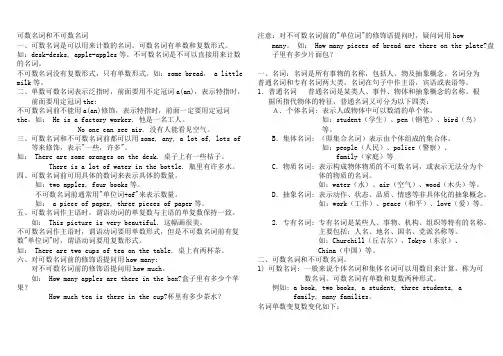
e a n dA l lt h in gs inf o rs om et可数名词和不可数名词一、可数名词是可以用来计数的名词。
可数名词有单数和复数形式。
如:desk-desks, apple-apples等。
不可数名词是不可以直接用来计数的名词。
不可数名词没有复数形式,只有单数形式。
如:some bread, a little milk等。
二、单数可数名词表示泛指时,前面要用不定冠词a(an),表示特指时,前面要用定冠词the;不可数名词前不能用a(an)修饰,表示特指时,前面一定要用定冠词the。
如: He is a factory worker. 他是一名工人。
No one can see air. 没有人能看见空气。
三、可数名词和不可数名词前都可以用some, any, a lot of, lots of等来修饰,表示"一些,许多"。
如: There are some oranges on the desk. 桌子上有一些桔子。
There is a lot of water in the bottle. 瓶里有许多水。
四、可数名词前可用具体的数词来表示具体的数量。
如:two apples, four books等。
不可数名词前通常用"单位词+of"来表示数量。
如: a piece of paper, three pieces of paper等。
五、可数名词作主语时,谓语动词的单复数与主语的单复数保持一致。
如: This picture is very beautiful. 这幅画很美。
不可数名词作主语时,谓语动词要用单数形式,但是不可数名词前有复数"单位词"时,谓语动词要用复数形式。
如: There are two cups of tea on the table. 桌上有两杯茶。
六、对可数名词前的修饰语提问用how many;对不可数名词前的修饰语提问用how much。
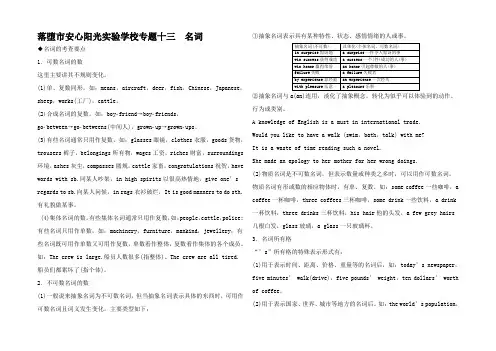
落堕市安心阳光实验学校专题十三名词◆名词的考查要点1.可数名词的数这里主要讲其不规则变化。
(1)单、复数同形。
如:means,aircraft,deer,fish,Chinese,Japanese,sheep,works(工厂),cattle。
(2)合成名词的复数。
如:boyfriend→boyfriends,gobetween→gobetweens(中间人),grownup→grownups。
(3)有些名词通常只用作复数。
如:glasses眼镜,clothes衣服,goods货物,trousers裤子,belongings所有物,wages工资,riches财富,surroundings 环境,ashes灰尘,compasses圆规,cattle家畜,congratulations祝贺,have words with sb.同某人吵架,in high spirits以很高热情地,give one’s regards to sb.向某人问候,in rags衣衫破烂,It is good manners to do sth.有礼貌做某事。
(4)集体名词的数。
有些集体名词通常只用作复数,如:people,cattle,police; 有些名词只用作单数,如:machinery,furniture,mankind,jewellery;有些名词既可用作单数又可用作复数,单数看作整体,复数看作集体的各个成员。
如:The crew is large.船员人数很多(指整体)。
The crew are all tired.船员们都累坏了(指个体)。
2.不可数名词的数(1)一般说来抽象名词为不可数名词,但当抽象名词表示具体的东西时,可用作可数名词且词义发生变化,主要类型如下:①抽象名词表示具有某种特性、状态、感情情绪的人或事。
②抽象名词与a(an)连用,淡化了抽象概念,转化为似乎可以体验到的动作、行为或类别。
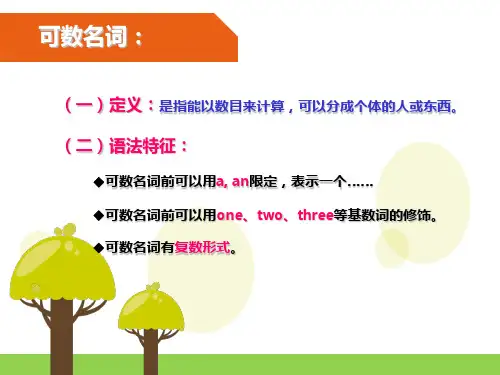
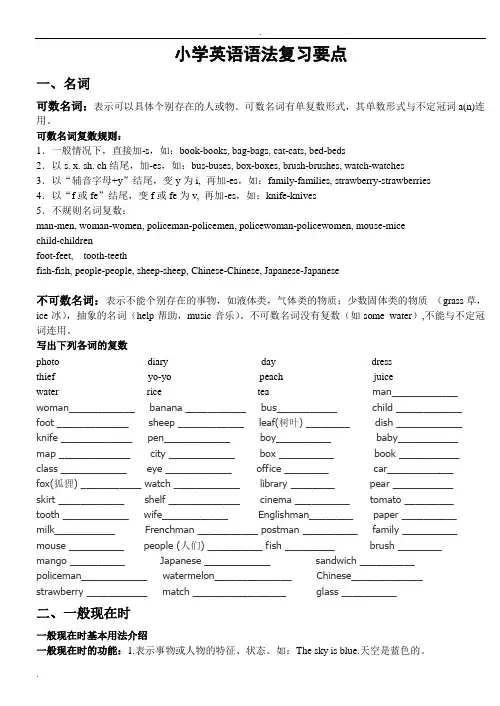
小学英语语法复习要点一、名词可数名词:表示可以具体个别存在的人或物。
可数名词有单复数形式,其单数形式与不定冠词a(n)连用。
可数名词复数规则:1.一般情况下,直接加-s,如:book-books, bag-bags, cat-cats, bed-beds2.以s. x. sh. ch结尾,加-es,如:bus-buses, box-boxes, brush-brushes, watch-watches3.以“辅音字母+y”结尾,变y为i, 再加-es,如:family-families, strawberry-strawberries4.以“f或fe”结尾,变f或fe为v, 再加-es,如:knife-knives5.不规则名词复数:man-men, woman-women, policeman-policemen, policewoman-policewomen, mouse-micechild-childrenfoot-feet, tooth-teethfish-fish, people-people, sheep-sheep, Chinese-Chinese, Japanese-Japanese不可数名词:表示不能个别存在的事物,如液体类,气体类的物质;少数固体类的物质(grass草,ice冰),抽象的名词(help帮助,music音乐)。
不可数名词没有复数(如some water),不能与不定冠词连用。
写出下列各词的复数photo ____________ diary ____________ day_____________ dress _______________ thief ___________ yo-yo ___________ peach___________ juice________________ water ____________ rice______________ tea ______________ man____________ woman____________ banana ___________ bus___________ child ____________ foot _____________ sheep ____________ leaf(树叶) ________ dish ____________ knife _____________ pen____________ boy__________ baby___________ map _____________ city ____________ box __________ book ___________ class ____________ eye ____________ office ________ car____________fox(狐狸) ___________ watch ____________ library ________ pear ___________skirt ____________ shelf _____________ cinema __________ tomato _________ tooth ____________ wife____________ Englishman________ paper __________milk___________ Frenchman ___________ postman __________ family __________ mouse __________ people (人们) __________ fish _________ brush ________ mango __________ Japanese ____________ sandwich __________policeman____________ watermelon______________ Chinese_____________ strawberry ___________ match _________________ glass __________二、一般现在时一般现在时基本用法介绍一般现在时的功能:1.表示事物或人物的特征、状态。
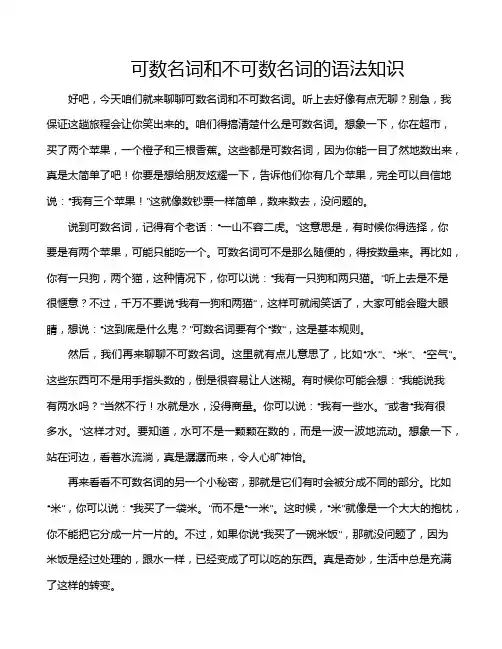
可数名词和不可数名词的语法知识好吧,今天咱们就来聊聊可数名词和不可数名词。
听上去好像有点无聊?别急,我保证这趟旅程会让你笑出来的。
咱们得搞清楚什么是可数名词。
想象一下,你在超市,买了两个苹果,一个橙子和三根香蕉。
这些都是可数名词,因为你能一目了然地数出来,真是太简单了吧!你要是想给朋友炫耀一下,告诉他们你有几个苹果,完全可以自信地说:“我有三个苹果!”这就像数钞票一样简单,数来数去,没问题的。
说到可数名词,记得有个老话:“一山不容二虎。
”这意思是,有时候你得选择,你要是有两个苹果,可能只能吃一个。
可数名词可不是那么随便的,得按数量来。
再比如,你有一只狗,两个猫,这种情况下,你可以说:“我有一只狗和两只猫。
”听上去是不是很惬意?不过,千万不要说“我有一狗和两猫”,这样可就闹笑话了,大家可能会瞪大眼睛,想说:“这到底是什么鬼?”可数名词要有个“数”,这是基本规则。
然后,我们再来聊聊不可数名词。
这里就有点儿意思了,比如“水”、“米”、“空气”。
这些东西可不是用手指头数的,倒是很容易让人迷糊。
有时候你可能会想:“我能说我有两水吗?”当然不行!水就是水,没得商量。
你可以说:“我有一些水。
”或者“我有很多水。
”这样才对。
要知道,水可不是一颗颗在数的,而是一波一波地流动。
想象一下,站在河边,看着水流淌,真是潺潺而来,令人心旷神怡。
再来看看不可数名词的另一个小秘密,那就是它们有时会被分成不同的部分。
比如“米”,你可以说:“我买了一袋米。
”而不是“一米”。
这时候,“米”就像是一个大大的抱枕,你不能把它分成一片一片的。
不过,如果你说“我买了一碗米饭”,那就没问题了,因为米饭是经过处理的,跟水一样,已经变成了可以吃的东西。
真是奇妙,生活中总是充满了这样的转变。
再说说那句老话:“海阔凭鱼跃,天高任鸟飞。
”可数名词和不可数名词之间的关系就像这个成语一样,各有各的天空。
可数名词给你一种自由的感觉,你可以随意添加、减少,像在超市里买东西一样。
七年级英语语法:可数名词和不可数名词名词的应用是英语语法的重要知识点,学习好英语的基础就是对语法的掌握,下面是小编给大家带来的七年级英语语法:可数名词和不可数名词,希望能够帮助到大家!可数名词变复数规则变化1、一般情况下,加s ;读音规则:清读/s/ ,浊、元/z/eg:book→books;desk→desks;pen→pens;car→carss遇t读[ts],遇d读[dz]eg:friend→friends; cat→cats;以s、x、ch、sh结尾的名词,加-es;读音规则:读[iz];eg:bus→buses; box→boxes; watch→watches; dish→dishes 以辅音字母+y结尾的名词,要把y变为i,再加-es;读音规则:读[z]。
eg:library---libraries; baby→babies;注意:元音字母加y结尾的单词直接加s;eg:toy→toys;boy→boys;以-f或-fe结尾的名词,要将-f或-fe变为-v,再加es;读音规则:读[vz];eg:knife→knives;leaf→leaves;以-o结尾的名词,有的加s,有的加es读音规则:读[z]。
初中阶段只有4个单词要加-es,其余都加-s;口诀:“黑人英雄爱吃土豆西红柿”eg:tomato→tomatoes西红柿; potato→potatoes土豆; hero→heroes英雄; Negro—Negroes其余eg:zoo→zoos; photo→photos;可数名词变复数不规则变化:1.单词内部发生变化:口诀:oo常常变ee,男人女人a变eeg:foot→feet脚;tooth→teeth牙齿;man→men男人;woman→women女人;2.单复数相同:羊鱼小鹿无变化,单数复数是一家eg:sheep→sheep绵羊;fish→fish鱼;deer→deer鹿;不规则变化:child→children孩子;mouse→mice老鼠;German→Germans德国人;某国人的复数有三种类型:口诀:中日不变,英法变,其它在后加sChinese, Japanese单数复数同形,不需加s;Englishman, Frenchman,复数要把man 变为men;其他各国人直接加s。
名词知识点的归纳总结名词是英语语法中的一类词汇,用于表示人、物、地方、抽象概念等。
在英语中,名词有很多不同的用法和形态变化规则。
下面将对几个常见的名词知识点进行归纳总结。
1. 可数名词与不可数名词:可数名词可以用数目词进行修饰,并且有复数形式,如book(书)、books(书们)。
不可数名词不能用数目词进行修饰,也没有复数形式,如water(水)、information(信息)。
需要注意的是,有些名词既可数又不可数,具体要根据语境来决定。
2. 单数名词与复数名词:大多数英语名词单数形式在末尾加上“s”来表示复数形式,如cat(猫)、cats(猫们)。
但也有一些名词复数形式有不规则变化,如man(男人)、men(男人们)。
3. 特殊名词的复数形式:有一些名词的复数形式与单数形式完全不同,如child(孩子)、children(孩子们);person(人)、people(人们)。
4. 形容词作为名词:形容词可以在句子中作为名词使用,表示一类人或物,或者泛指某种特性。
这时,它们一般前面用定冠词“the”来修饰,如the rich(富人)、the poor(穷人)。
5. 复合名词:复合名词由两个或更多个词组合而成,可以加上连字符“-”或直接连接,如mother-in-law(岳母)、safety net(安全网)。
复合名词的构词规则比较灵活,需要根据具体词组进行记忆。
总结起来,名词是英语语法中的重要词类,涉及到可数与不可数、单数与复数、特殊名词的变化以及形容词和复合名词的使用。
熟练掌握这些名词知识点对于正确理解和运用英语非常重要。
希望这些归纳总结对您有所帮助!。
小升初英语语法零基础:可数名词(上)可数名词的语法特征1. 可数名词可以受不定冠词"a,an"的修饰。
This is a book. 这是一本书。
Pass me an egg, please. 请递给我一个蛋。
2. 可数名词可以受基数词的修饰。
There are four pears on the plate. 盘子上有四个梨。
3. 可数名词有复数形式。
Who are those women under the tree? 树下那些女人是谁?How many people are there in your family? 你们家有几口人?I don't like pineapples. 我不喜欢菠萝。
4. 可数名词的单数形式不能独立使用,必须有"a,the,my"等的修饰。
She never wears a hat. 她从不戴帽子。
(泛指)Be careful of the dog. 当心那条狗。
(特指)That's her bag. 那是她的提包。
5. 复数名词可以独立使用,表示泛指。
Horses are useful animals. 马是有用的动物。
(泛指)复数形式变化及发音规则>>复合名词改成复数形式一. 在词尾加 -s 或 -es1. 主体名词在词末bedroom → bedrooms 卧室toothbrush → toothbrushes 牙刷greenhouse → greenhouses 温室letter-box → letter-boxes 信箱2. 没有主体名词go-between → go-betweens 中间人break-in → break-ins 闯入has-been → has-beens 过时的人、过时的物forget-me-not → forget-me-nots 勿忘草hand-me-down → hand-me-downs 旧衣二. 在主体名词词尾加 -s 或 -esson-in-law → sons-in-law 女婿editor-in-chief → editors-in-chief 总编辑commander-in-chief → commanders-in-chief 总司令passer-by → passers-by 过路人vice-premier → vice-premiers 副总理三. 两个构成部分都要变成复数形式a woman cook → women cooks 女厨师a man nurse → men nurses 男护士。
英语语法规则总结本一、名词名词是指表示人、事物、地点、抽象概念等的名称。
名词有以下几种用法和规则:1. 可数名词:表示可以单独计数的事物,可以有单数形式和复数形式。
- 单数形式:指代一个事物。
- 复数形式:指代多个同类事物。
2. 不可数名词:表示无法单独计数的事物,只有单数形式。
- 不能与数词连用。
- 可与量词连用。
3. 名词所有格:表示名词的所有关系。
- 单数名词在词尾加 "'s"。
- 复数名词在词尾加 "'"。
二、动词动词是指表示动作、状态、存在等的词语。
动词有以下几种用法和规则:1. 时态:动词有过去、现在和将来三种时态。
- 过去时:表示过去发生的动作或状态。
- 现在时:表示现在正在进行的动作或状态。
- 将来时:表示将来要发生的动作或状态。
2. 语态:动词有主动语态和被动语态两种语态。
- 主动语态:表示主语是动作的执行者。
- 被动语态:表示主语是动作的承受者。
3. 祈使句:表示命令、请求、建议等的句子。
- 谓语动词用原形。
- 用来表示请求时,可以在句首加上 "请"。
三、形容词形容词是指修饰名词、代词等词语的词语,用于描述事物的特征、性质等。
形容词有以下几种用法和规则:1. 形容词作前置定语:形容词位于名词前面,并与名词构成描述关系。
- 一般情况下,形容词在单数名词前加不定冠词 "a" 或 "an",在复数名词前加 "some"。
2. 形容词作表语:形容词位于系动词之后,用于描述主语的特征。
- 系动词包括 "be"、"seem"、"look" 等。
- 不定冠词 "a" 或 "an" 可以与形容词连用,表示一种特征。
以上是英语语法规则的简要总结,有助于理解和掌握英语语法的基本要点。
英语语法中的可数名词和不可数名词英语作为世界上最重要的语言之一,它的语法结构备受关注,其中可数名词和不可数名词是重要的部分。
这两个名词的区别看似简单,实际上会涉及到很多语法细节,使用不恰当会导致严重的语法错误,甚至影响理解和传达信息。
下面我们来谈谈英语语法中的可数名词和不可数名词。
一、可数名词我们常见的物品,如书、椅子、桌子、苹果等等都是可数名词。
因为它们是可以被数出来的,用数量词(如“one”,“two”,“three”,“several”,“many”等)来表示。
并且可数名词有单数和复数两种形式,单数指一个例子,复数指多个例子(如book-books)。
除了常规的物品外,还有一些抽象的概念也可以作为可数名词,如idea(想法),fact(事实)等等。
这些抽象的概念需要放在单数形式下来使用,虽然可以用数量词表示个数,但是不能用复数形式。
二、不可数名词不可数名词指的是那些无法被数统计的物品,如水、牛奶、咖啡、爱情、温暖等,它们不属于可数范畴,不能用数量词来表示个数。
不可数名词没有复数形式,不能和a或an这种冠词连用。
如果想要表示它们的数量,则需要使用量词(如a bottle of water),或者用some, much, a lot of, a little 等词来表达。
另外需要注意的是,有些物品既可以作为可数名词,也可以作为不可数名词。
如water可以表示水的总体,也可以表示一瓶水,还可以表示水的质量和温感等具体信息。
这时候需要根据语境和翻译来判断其在具体情境下的词性。
三、常见问题讨论1.数量词的使用在使用可数名词时,需要匹配数量词来表示数量,但是数量词的使用也要遵循一定的规则。
当表示整数时,使用整数词(如one,two,three),当表示不确定的数量时,使用不定词(如some,a few,many),当表示比较确定的数量时,使用定数(如two,three)等等。
在使用不可数名词时,同样需要使用的数量词,但是需要注意的是,不可数名词只能使用不定数量词(如some, a lot of, much,a little)和一些限定描述词表达数量,不能使用整数词,因为它们不成为数量。
可数名词语法要点(Main points )1) Count nouns have two forms, singular and plural.可数名词为两种形式:单数和复数。
2) They can be used with numbers.可数名词可与数字连用。
3) Singular count nouns always take a determiner.可数名词单数前需用限定词。
4) Plural count nouns do not need a determiner.可数名词复数前不需用限定词。
5) Singular count nouns take a singular verb and plural nouns take a plural verb. 可数名词单数与动词的单数形式搭配,而可数名词复数与动词的复数形式搭配。
语法透析1)Count nouns have two forms. The singular form refers to one thing or person. The plural form refers tomore than one thing or person.可数名词分为两种形式:单数和复数。
单数指一个人物或事物;复数则指多个人物或事物。
例如:…a book … … the teacher一本书那个老师…books… … some teachers 一些书一些老师2) Count nouns can be used with numbers.可数名词可与数字连用。
例如:…one table ……twocats …一张桌子两只猫...three hundred pounds 三百镑3) Singular count nouns cannot be used alone, but always take a determiner such as “a”, “another”, “every”, or “the”.可数名词单数不能单独使用,需与“a”“another”“every”或“the”等限定词连用。
例如:1) He was eating another apple. 他在吃另一只苹果。
2) I parked the car over there. 我把这辆车停在那边。
4) Plural count nouns can be used with or without a determiner. They do not take a determiner when they refer tothings or people in general.可数名词复数可用也可不用限定词。
当复数可数名词泛指人物或事物时不需用限定词。
例如:1) Does the hotel have large rooms? 这家酒店有没有大房间?2) The film is not suitable for children. 这部影片少儿不宜。
5) Plural count nouns do take a determiner when they refer precisely to particular things of people. 当可数名词复数指特定的人物或事物时必须要用限定词。
例如:1) Our computers are very expensive. 我们的电脑很贵。
2) These cakes are delicious. 这些蛋糕十分可口。
6) When a count noun is the subject of a verb, a singular count noun takes a singular verb. A plural count noun takes aplural verb.可数名词单数与动词的单数形式搭配,而可数名词复数与动词的复数形式搭配。
例如:1) My son likes playing football. 我儿子喜欢踢足球。
2) I thought more people were coming. 我以为有更多人会来1 He was eating another apple.2 I parked the car over there.3 Does the hotel have large rooms?4 The film is not suitable for children.5 Our computers are very expensive.6 These cakes are delicious.7 My son likes playing football.8 I thought more people were coming.单数和复数语法要点(Main points)1) Singular nouns are used only in the singular, always with a determiner. 单数名词只有单数形式,总是与限定词连用。
2) Plural nouns are used only in the plural, some with a determiner.复数名词只有复数形式,不一定与限定词连用。
3) Collective nouns can be used with singular or plural verbs.集体名词可与动词的单数或复数形式搭配。
*Some nouns are used in particular meanings in the singular with a determiner, like count nouns, but arenot used in the plural with that meaning. They are often called “singular nouns”.某些名词的单数与限定词搭配构成特定的含义,其复数则可能有不同的意思。
这种名词叫做单数名词。
语法透析1)Some of these nouns are normally used with “the” because they refer to things th at are unique. 一些单数名词一般与定冠词“the”搭配,表示独一无二的事物。
如:air(空气) country(国家) countryside(乡下)dark(黑暗) daytime(白天)end(尽头) future(未来) ground(地面)moon(月亮) past(过去)sea(海洋) seaside(海滨) sky(天空)sun(太阳) wind(风)world(世界)例如:1) The sun was shining. 太阳闪耀。
2) I am scared of the dark. 我害怕黑暗。
2) Some nouns are used in particular meaning in the plural without determiners, like count nouns, but are not used inthe singular with that meaning. They are often called “plural nouns”.有些名词是复数含义,无需限定词,如可数名词,单数则可能表示不同意思。
这种名词叫做复数名词。
例如:1) His clothes looked terribly dirty. 他的衣服看上去脏得要命。
2) Troops are being sent in today. 部队今天被派去。
3) With some nouns that refer to a group of people or things, the same form can be used with singular or plural verbs,because you can think of the group as a unit or individuals. Similarly, you can use singular or plural pronouns torefer back to them. These nouns are often called “collective nouns”.一些名词指代一组人物或事物,单复数同形,既可以把一组看成一个整体,也可以看成个体的集合。
同样地,可以用单数或复数形式的代名词指代,这种名词叫做集体名词。
例如:1) Our family isn’t poor any more. 我家不再贫穷了。
2) My family are perfectly normal. 我家是普通的家庭1 The sun was shining. 1 太阳闪耀。
2 我害怕黑暗。
2 I am scared of the dark.3 他的衣服看上去脏得要命。
3 His clothes looked terribly dirty.4 部队今天被派去。
4 Troops are being sent in today.5 我家不再贫穷了。
5 Our family isn't poor any more.6 我家是普通的家庭。
6 My family are perfectly normal.1 The sun was shining.2 I am scared of the dark.3 His clothes looked terribly dirty.4 Troops are being sent in today.5 Our family isn't poor any more.6 My family are perfectly normal.不可数名词语法要点(Main points)1) Uncount nouns have only one form, and take a singular verb. 不可数名词只有一种形式,与动词的单数搭配。
2) They are not used with “a”, or with numbers.不可数名词不与不定冠词“a”以及数字连用。
3) Some nouns can be both uncount nouns and count nouns.有些名词既可以是可数名词,也可以是不可数名词。
语法透析1) English speakers think that some things cannot be counted directly. The nouns which refer to these uncountablethings are called uncount nouns. Uncount nouns often refer to:英语中认为某些事物是不能直接记数的,代指这些事物的名词叫不可数名词,通常包括: substances: coal food ice iron rice steelwater物质:煤食物冰铁米刚水human qualities: courage cruelty honesty patience个人品质:勇气冷酷诚实耐心feelings: anger happiness joy pride relief respect感情:愤怒幸福欢娱骄傲放松尊敬activities: aid help sleep travel work活动:援助帮助睡觉旅行工作abstract ideas: beauty death freedom funlife luck抽象概念:美丽死亡自由乐趣生活运气例如:1) The donkey needed food and water. 这驴子需要食物和水。